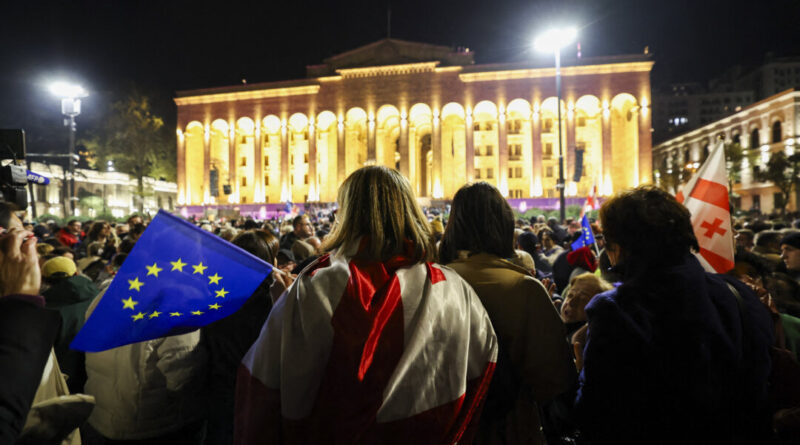Following a controversial election, thousands gather in Georgian capital to protest ruling party’s victory
Viktor Orban, the Hungarian leader, visited the capital post the election, describing the parliamentary poll as ‘free and democratic’.
On Oct. 28, in Tbilisi, Georgia’s capital, thousands of people held demonstrations to protest the parliamentary poll results won by the ruling Georgian Dream party.
Georgian Dream secured nearly 54 percent, around 1.12 million votes, of all cast ballots in the Oct. 26 poll, as per the electoral commission.
However, the opposition alleges that the poll was skewed in favor of the ruling party.
Protester Ana Korkia, a 28-year-old resident of Tbilisi, told Reuters that she participated in the demonstration to showcase to European leaders that the election result was not their choice.
So far, the protests have been mostly peaceful.
Four opposition parties that gained assembly seats have refused to acknowledge the poll’s outcome and have pledged to boycott all parliamentary activities.
Both Georgian Dream and the electoral commission maintain that the results reflect the will of the people.
Despite criticisms from the West, including Brussels and Washington, alleging irregularities in the poll, both the European Union and NATO have called for an investigation into the results.
A monitoring mission led by the Organization for Security and Cooperation in Europe, based in Vienna, reported several violations but did not categorically state that the election was fraudulent.
Based on alleged “anti-democratic practices,” the United States has imposed sanctions and visa restrictions on Georgian officials and has urged a comprehensive investigation into the election results.
“Consistently, we have urged the Georgian government to retract its anti-democratic actions and return to its Euro-Atlantic path.
“We do not rule out further consequences if the Georgian government does not change its course.”
Immediately after the results were announced, Salome Zourabichvili, Georgia’s pro-western president, urged her supporters to demonstrate outside the parliament building in Tbilisi to express their discontent.
“Together, peacefully, we will defend what is ours: your constitutional right to have your vote honored.”
“The methodology used and the backing of most probably Russian FSB [Federal Security Service] operatives is evident in this election,” she remarked.
“Blaming Russia for interference on any occasion has become a common practice for many countries,” a Kremlin spokesperson remarked, dismissing the accusations as “completely unfounded.”
The ruling party’s critics, both locally and internationally, have long accused it of trying to strengthen Georgia’s ties with Moscow, which have been frozen—officially at least—since 2008.
They also accuse Georgian Dream of endangering the country’s prospects of joining the European Union, which granted Georgia candidate status last year.
However, after Georgia enacted laws this summer against perceived foreign influence, Brussels later suspended Georgia’s membership bid. Georgian Dream reiterates its support for the country’s eventual accession to the 27-member European bloc.

Founder of the ruling Georgian Dream party Bidzina Ivanishvili and Georgian Prime Minister Irakli Kobakhidze at the party’s headquarters after exit polls were announced on Oct. 26, 2024. Giorgi Arjevanidze/AFP via Getty Images
Hungary’s Orban Backs Results
After the poll, Hungarian Prime Minister Viktor Orban visited Tbilisi, where he praised Georgian Dream on their electoral win and described the election as “just and democratic.”
“I can see that no one would dare challenge the fairness and democracy of this election. “
Despites criticisms from the Western nations, Orban mentioned, “No one dared to go that far.”
He also expressed support for Georgia’s EU membership aspirations, stating that the ruling party’s electoral success mirrored the country’s “pro-European choice.”
Kobakhidze appreciated Orban for Hungary’s strong support for Georgia’s EU membership endeavor, citing Hungary’s unique role in helping Georgia attain candidate status.
Since July 1st, Hungary has held the rotating six-month presidency of the European Council.
More than a dozen EU foreign and European affairs ministers condemned Orban’s visit to Tbilisi as “premature,” stating in a joint statement that the Hungarian leader “does not represent the EU.”
“To ensure transparency, all authorized representatives are invited to observe the ballot recount process,” the commission stated in an announcement on Oct. 29.
Reuters contributed to this report.





